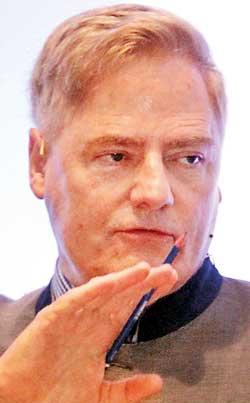
A top free market capitalist this week cautioned that the current International Monetary Fund (IMF)-backed high tax regime could give further rise to informal economy in Sri Lanka, thereby slowing down the economic recovery and ultimately narrowing the tax base.
Atlas Network Executive Vice President (International Programmes) Dr. Tom G. Palmer pointed out that nations plunged into debt crisis have come out of crisis by embracing a simplified low tax rate, and rejecting IMF-prescribed high tax rate.
Dr. Palmer shared his comments at a panel discussion held at the Economic Freedom Summit organised by the Advocata Institute in Colombo.
He noted that Greek government’s bold stance against IMF-prescribed high taxation to pay off debt has ultimately resulted in a booming economy led by the tourism sector and an increase tax collection due to expansion of the tax base.
War-torn Ukraine has adopted a similar move by embracing a flat tax rate, moving away from its complex ‘optimised tax rate’ which benefited corrupt oligarchs in
the nation.
Therefore, he urged Sri Lankan government to take a bold stance with IMF on taxation.
Dr. Palmer also stressed that a lower tax rate must be accompanied with digitisation and cutting down of excess bureaucracy in the public sector to reduce corruption.
He pointed out that Former U.S.S.R nation, Georgia managed to reform and replace its entire police force that had fallen deep into corruption and human right abuses within a short period of three months. He highlighted that such bold policies followed by actions in fact could produce desired results.







